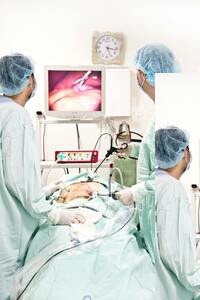
27 Jun The Future of Endoscopy: Technology on The Horizon
Endoscopy, a crucial diagnostic and therapeutic tool in modern medicine, is constantly evolving. Advancements in technology are set to revolutionise how endoscopic procedures are performed, enhancing their accuracy, safety, and efficacy.
Here, we explore the emerging trends and innovations shaping the future of endoscopy.
Artificial Intelligence and Machine Learning
One of the most promising developments in endoscopy is the integration of artificial intelligence (AI) and machine learning. These technologies enhance diagnostic capabilities by providing real-time image analysis, which helps in the identification of abnormalities, polyps, and early signs of cancer with unprecedented accuracy.
Machine learning algorithms can also predict patient outcomes and suggest personalised treatment plans based on vast amounts of historical data, improving overall patient care.
Miniaturisation and Micro-Robotics
The trend towards miniaturisation is leading to the development of swallowable capsules equipped with tiny cameras. These capsules can capture high-quality images of the gastrointestinal tract as they travel through it, offering a less invasive alternative to traditional endoscopy.
Additionally, micro-robotic devices are being developed to navigate and perform procedures within the body with high precision, reducing the need for larger incisions and enhancing recovery times.
 Advanced Imaging Techniques
Advanced Imaging Techniques
Imaging technology in endoscopy is continuously improving, with high-resolution imaging (such as 4K and even 8K resolution) providing clearer and more detailed visuals.
Narrow Band Imaging (NBI) enhances the visibility of vascular structures and mucosal patterns, making it easier to detect early-stage cancers. These advancements in imaging techniques enable more accurate diagnoses and better patient outcomes.
Flexible Endoscopes and Shape-Sensing Technology
The development of flexible endoscopes offers better manoeuvrability and access to hard-to-reach areas within the body.
Shape-sensing technology provides real-time feedback on the shape and position of the endoscope, increasing safety and precision during procedures. These innovations make endoscopic examinations more thorough and effective.
Therapeutic Endoscopy
Advancements in therapeutic endoscopy now allow for more complex procedures to be performed endoscopically. This includes the removal of tumours or the repair of tissues, reducing the need for open surgeries and enhancing patient recovery.
Endoscopes equipped with drug delivery mechanisms can administer medication directly to affected areas, improving treatment efficacy and outcomes.
Telemedicine and Remote Procedures
The integration of telemedicine with endoscopy is another groundbreaking development. Surgeons can now perform procedures remotely using robotic endoscopy systems, making expert care accessible even in remote or underserved areas.
Tele-endoscopy, which involves the remote interpretation of endoscopic images and videos, allows for real-time consultation with specialists from different locations, ensuring that patients receive the best possible care regardless of their location.
Biomarker Detection
Combining endoscopy with molecular imaging techniques enables the detection of specific biomarkers, aiding in the early diagnosis of diseases at a molecular level.
Fluorescent imaging helps identify abnormal tissues that may not be visible with standard endoscopic imaging. These techniques enhance the precision of diagnostic procedures and allow for earlier and more accurate detection of diseases.
Integration with Other Technologies
Augmented reality (AR) and 3D printing are also making their way into endoscopy. AR can overlay diagnostic information and guidance onto the endoscopic view, assisting surgeons during procedures.
Custom 3D-printed endoscopic tools tailored to specific patient anatomy can improve the precision and outcomes of procedures, offering a new level of personalization in medical care.
Data Integration and Analysis
The integration of endoscopic data with electronic health records (EHRs) allows for comprehensive data analysis, improving patient management and outcomes.
Secure cloud-based storage of endoscopic images and videos facilitates easy access and sharing among healthcare professionals, enhancing collaborative care and research.
Conclusion
The future of endoscopy is bright, with numerous technological advancements poised to enhance the field significantly. From AI and machine learning to miniaturisation and micro-robotics, these innovations promise to improve the accuracy, safety, and efficacy of endoscopic procedures.
The emerging technologies in endoscopy represent a significant leap forward compared to existing methods. Traditional endoscopic procedures, while effective, often rely on human interpretation of visual data, which can be subjective and occasionally prone to oversight. In contrast, advancements such as artificial intelligence and machine learning bring a new level of objectivity and precision to diagnostics, enabling real-time analysis and automated detection of abnormalities with unparalleled accuracy.
Miniaturised devices and micro-robotics offer less invasive alternatives, minimising patient discomfort and recovery times compared to conventional endoscopy. Advanced imaging techniques, including high-resolution and fluorescent imaging, provide clearer and more detailed views, improving diagnostic capabilities.
Moreover, the integration of telemedicine and remote procedures extends the reach of specialised care to remote areas, ensuring equitable access to expert diagnosis and treatment. These innovations not only enhance the effectiveness of endoscopic procedures but also promise to reshape the future of healthcare delivery by optimising outcomes and patient experience.
As these technologies continue to evolve, they will undoubtedly lead to better patient outcomes and transform the landscape of medical diagnostics and treatment.
Some links may be sponsored. Products are not endorsed.
Always seek the advice of your physician or other qualified health and ask your doctor any questions you may have regarding a medical condition. In addition to all other limitations and disclaimers in this agreement, service provider and its third party providers disclaim any liability or loss in connection with the content provided on this website.
Last Updated on July 24, 2024 by Marie Benz MD FAAD
